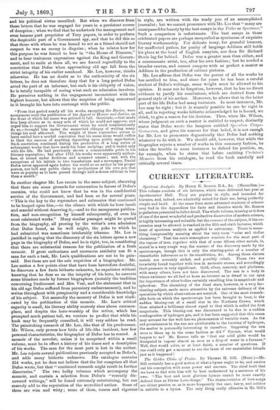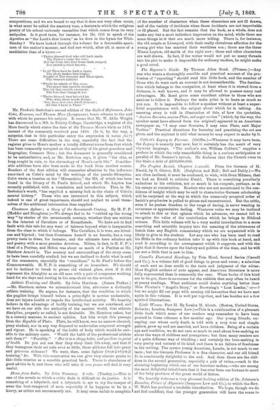The Golden Chain of Praise. By Thomas H. Gill. (Hunt.) — Mr.
Gill certainly has a good notion of what a hymn ought to be, and carries out his conception with some power and success. The chief fault that we have to find with him will be best understood by a sentence of his own. "The best and most glorious hymns cannot be more exactly defined than as Divine Love-Songs." The characteristics of love-songs are either passion or, as is more frequently the case, fancy, and neither is suitable to a hymn. The only thing really offensive in Mr. Gill's
compositions, and we are bound to say that it does not very often occur, is what must be called the amatory tone, a feature in which the religions poetry of his school curiously resembles that which comes from its very antipodes. Is it good taste, for instance, for Mr. Gill to speak of the Apostles as "the Lord's first lovers," as he does in the hymn for Whit.- Sunday? We have looked through the volume for a favourable speci- men of the author's manner, and find one which, after all, is more of a meditation than of a hymn :—
" Thrice blessed Soul who still bath made The Father's name his own ;
Nor far from that dear home bath strayed, Nor parted portion known.
"In all Thou haat he bath a share, Thy glory makes him bright ; Naught of Thy treasure wilt Thou spare, Thy treasure Infinite!
"Freely he taketh of Thy store, The peace that passeth thought, The joy that stayeth evermore, The love that changeth not.
" Thrice blessed, beat belovtd he Who wins these words divine; 'Son, thou dost ever dwell with me ; All that I have is fine.'"
Mr. Frederic Seebohm's second edition of the Oxford Reformers, John Colet, Erasmus, and Thomas More (Longmans), bears witness to the zeal with which he pursues his subject. It seems that Mr. W. Aldis Wright has discovered in a MS. in Trinity College, Cambridge, a register of the More family which states the date of Sir Thomas More's birth as 1478, instead of the commonly received year 1480. (Is it, by the way, a misprint, that in this particular entry the expression is natus fui ?) There are some difficulties in the way, especially the fact that the register gives to More's mother a totally different name from that which has been commonly accepted on the authority of his great-grandson and biographer, Cresacre More; but the document is generally considered to be authoritative, and, as Mr. Seebohm Bays, it gives "the clue, so long sought in vain, to the chronology of More's early life." Consider- able additions have also been made to the book from another source. Readers of the first edition will remember allusions to the influence exercised on Colet's mind by the writings of the pseudo-Dionysins. Colet wrote a treatise on the "Hierarchies," the MS. of which has been found in the library of St. Paul's School, and which Mr. Lupton has recently published, with a translation and introduction. This, in Mr. Seebohm's words, "has supplied a missing link in the chain of Colet's mental history." Those who are interested in this subject, which Indeed is one of great importance, should not neglect to avail them- selves of the additional information thus supplied.































 Previous page
Previous page